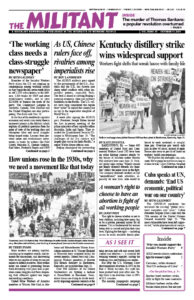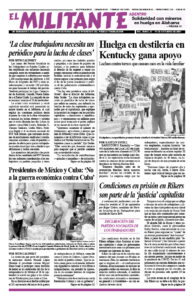October 14, 1996
Workers, farmers, youth, and all defenders of civil liberties need to protest moves by Washington to undermine the democratic rights of opponents of U.S. policy toward Cuba and defend those threatened with fines, imprisonment, or firings for activities protected by the U.S. Constitution and Bill of Rights.
Class-conscious workers need to understand and explain that working people and others are under no constitutional obligation to voluntarily collaborate with the FBI, Treasury Department, ATF or their finks.
These probes to narrow the space for political action coincide with efforts to try to push through new “anti-terrorist” measures that curtail the democratic rights of all.
These steps are part of the preparation for further assaults on the social wage, working conditions, and livelihood of working people. They are a threat to the entire working-class movement.
October 15, 1971
OCT. 6 — President Nixon today invoked the antilabor Taft-Hartley law to force the striking longshoremen on the West Coast back to work. On Oct. 1, all seaports on the East and West Coasts, and the port of Beaumont, Texas, on the Gulf were closed by dockworkers, whose contract had expired.
In the face of this massive shutdown of a vitally important industry, Nixon appointed a five-member board of inquiry Oct. 4 to recommend when and under what conditions longshoremen should be ordered back to work.
The employers seek to reduce the waterfront work force, subject longshoremen to the uncertainties of irregular ship arrivals, and hire them as part-time workers on an hourly basis. Longshoremen on all coasts have an opportunity at this juncture to establish uniform working conditions and wages with guaranteed annual pay for 2,080 hours.
October 12, 1946
AMSTERDAM, Sept. 27 — Widespread indignation against the Dutch government’s suppression of the Indonesian struggle for independence led to organized protest movements of soldiers culminating in mass demonstrations and a general strike in this city.
During the second week in September, the soldiers at the Harderwijk camp were informed that they were to embark for Indonesia. The soldiers bluntly refused to go.
They formed a committee and issued two leaflets. The first called on the soldiers for action against shipment to Indonesia. The second called on the dock workers and the unions in general to demonstrate their disapproval of the imperialist aims of the government by striking against embarkation orders.
Both leaflets created a tremendous impression. Soldiers and workers responded with a mass sentiment of sympathy.

